Introduction
As a savvy business owner, you understand that each expense can make a significant difference in your bottom line. Harnessing the power of a business credit card can turn these expenditures into rewarding opportunities. From lucrative rewards and cash back incentives to invaluable travel protections and streamlined expense management, these cards offer a plethora of benefits.
To unlock the perfect fit for your business, it’s crucial to pinpoint your priorities – whether it’s maximizing rewards, earning cash back, or building credit – and choose the card that aligns best with your needs. It’s time to transform your everyday transactions into strategic financial moves that propel your business forward.
Consider the following Business credit cards that are suitable for you as a beginner;
1. Ink Business Unlimited® Credit Card
2. Chase Ink Business Preferred Credit Card
3. Capital One Spark 2% Cash Plus
4. CitiBusiness AAdvantage Platinum Select Mastercard
5. The Blue Business® Plus Credit Card from American Express
Overview of Best Business Credit Cards for Beginners
How to Choose Best Business Credit Cards for Beginners
Pros and Cons of Best Business Credit Cards for Beginners
What to Watch Out For
Pro Tips
Recap
1. Chase Ink Business Unlimited® Credit Card
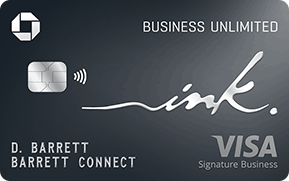
Consider the Chase Ink Business Unlimited® Credit Card as your ideal choice. It boasts a straightforward rewards program, giving you 1.5% cash back on all purchases without any annual fee, making it perfect for business owners like you. You’ll appreciate the simplicity it brings, as it eliminates the need to track spending categories. Moreover, the absence of an annual fee is a significant advantage, particularly for those focused on building credit without incurring additional costs.
Pros
- Does not require annual fee.
- Offers unlimited 1.5% cash back on all purchases.
- Offers welcome bonus after meeting a spending requirement.
- Grants Ability to transfer points to other Chase cards if you also have a Chase Sapphire Preferred or Chase Sapphire Reserve card.
- Provides extended warranty protection, purchase protection, and travel accident insurance.
Cons
- Requires a foreign transaction fee of 3% of each transaction in U.S. dollars for foreign purchases.
- Does not offer any bonus rewards categories, so if your business spends heavily in a specific category, you might be missing out on potential rewards.
- Welcome Bonus: Earn $750 bonus cash back after you spend $7,500 on purchases in the first 3 months from account opening.
- Earning Potential: Unlimited 1.5% cash back on all purchases.
- Annual Fee: $0
- Foreign Transaction Fee: 3% of each transaction in U.S. dollars.
2. Chase Ink Business Preferred Credit Card
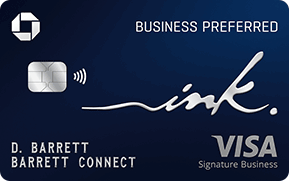
The Chase Ink Business Preferred Credit Card emerges as the standout choice, and here’s why. Firstly, the card’s generous 100,000-point welcome bonus, earned through meeting a feasible spending target, ensures you start strong. With its tailored rewards structure, businesses heavily investing in advertising, travel and internet/cable/phone services can expect significant gains. Additionally, it addresses your travel needs, allowing you to redeem points via Chase’s Ultimate Rewards portal or transfer them to airline and hotel partners. Adding to its appeal, the card provides additional business benefits like cell phone protection and travel and purchase insurance, reinforcing its status as the ultimate choice for businesses keen on maximizing value and safeguarding their interests.
Pros
- Offers high-value welcome bonus.
- Grants 3X points on travel, shipping, internet, cable, and phone services, and advertising purchases made with social media sites and search engines each account anniversary year.
- Allows 1X point on all other purchases.
- Does not charge any foreign transaction fees.
- Provides additional business benefits like cell phone protection, purchase protection, and travel insurance.
Cons
- Charges annual fee of $95.
- Prefers a good to excellent personal credit score for approval.
- Welcome Bonus: Earn 100,000 bonus points after spending $15,000 on purchases in the first 3 months from account opening.
- Earning Potential: 3X points per $1 on the first $150,000 spent on travel, shipping, internet, cable, and phone services, and advertising purchases made with social media sites and search engines each account anniversary year. 1 point per $1 on all other purchases.
- Annual Fee: $95
- Foreign Transaction Fee: None.
3. Capital One Spark 2% Cash Plus
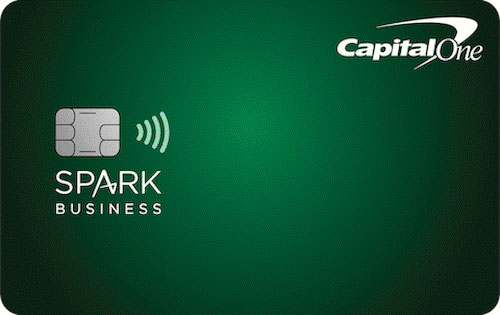
As a start-up business owner, the Capital One Spark 2% Cash Plus Credit Card is a top-notch choice. You’ll enjoy consistent 2% cash back on all purchases, no matter how much you spend. It also comes without any foreign transaction fees and presents an attractive welcome bonus – for instance, $500 cash back after you spend $4,500 in the first three months of opening your account. An added perk is the ability to obtain free employee cards, facilitating seamless management of your business expenses. Plus, the card offers robust fraud protection and a suite of business benefits to safeguard your interests. If you prefer straightforward cash back rewards over complex points systems and rotating bonus categories, this card is tailor-made for you.
Pros
- Grants unlimited 2% cash back on every purchase with no caps.
- Does not require any foreign transaction fees.
- Offers decent welcome bonus (e.g., $500 cash back after spending $4,500 within 3 months).
- Provides fraud coverage, extended warranty, and purchase protection.
Cons
- Requires annual fee of $95 after the first year (waived for the first year).
- Does not offer many bonus rewards categories compared to some other cards.
- Welcome Bonus: Earn a one-time $500 cash bonus once you spend $4,500 on purchases within 3 months from account opening.
- Earning Potential: Earn unlimited 2% cash back on every purchase, with no caps or restrictions.
- Annual Fee: $0 intro for the first year, $95 after that.
- Foreign Transaction Fee: None.
4. CitiBusiness AAdvantage Platinum Select Mastercard
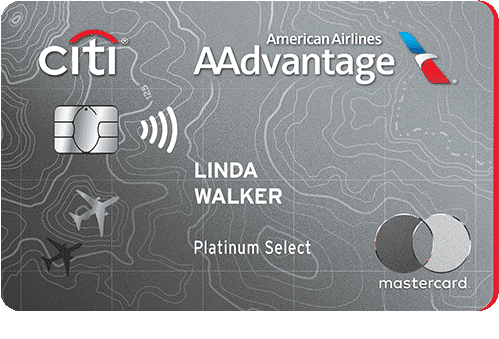
The CitiBusiness AAdvantage Platinum Select Mastercard is known for its significant welcome bonus of miles, awarded after reaching a specified spending threshold. Additionally, the card offers bonus miles for select categories, especially for American Airlines purchases. This feature makes it an attractive option for businesses, particularly those frequently traveling with American Airlines.
Moreover, the card provides appealing benefits for businesses that frequently utilize American Airlines services. These benefits include perks such as complimentary first checked bags and preferred boarding, which can enhance the travel experience for cardholders and their employees.
Pros
- Offers high-value welcome bonus of miles after spending a certain amount.
- Provides 2X miles on American Airlines purchases and certain other categories (e.g., gas stations, telecommunications merchants, car rental merchants).
- Offers first checked bag free for you and up to 4 companions on domestic American Airlines flights.
- Does not require foreign transaction fees.
Cons
- Requires annual fee of $99, waived for the first 12 months.
- Demands for a good to excellent credit score for approval.
- Provides limited redemption options compared to flexible points programs.
- Welcome Bonus: Earn 65,000 American Airlines AAdvantage® bonus miles after spending $4,000 in purchases within the first 4 months of account opening.
- Earning Potential: Earn 2X AAdvantage® miles per $1 spent on eligible American Airlines purchases and on purchases at telecommunications merchants, cable, and satellite providers, car rental merchants, and at gas stations.
- Annual Fee: $99, waived for the first 12 months.
- Foreign Transaction Fee: None.
>>>PRO TIPS: How to Get an Alliant Business Credit Card
5. The Blue Business® Plus Credit Card from American Express
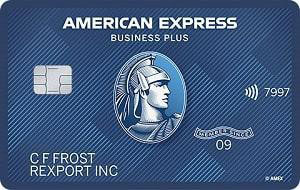
Consider the Blue Business® Plus Credit Card from American Express for your business. With its strong earning potential and no annual fee, it’s an excellent choice for business owners like you. While the welcome bonus may vary at the time of application, it often provides a decent incentive to new cardholders. This card allows you to transfer points to American Express airline and hotel partners, giving you flexibility in reward redemption. Additionally, it offers additional business benefits such as purchase protection and an extended warranty, enhancing your overall cardholder experience.
Pros
- Does not require annual fee.
- Offers 2X Membership Rewards points on the first $50,000 in purchases each year.
- Grants ability to transfer points to American Express airline and hotel partners.
- Generates AmEx Offers for additional savings.
- Provides purchase protection, extended warranty, travel and baggage insurance.
Cons
- Requires a good to excellent credit score for approval.
- Offers limited redemption options compared to flexible points programs like Chase Ultimate Rewards.
- No welcome Bonus.
- Earning Potential: 2X Membership Rewards points on every dollar spent, up to $50,000 per year.
- Annual Fee: $0
- Foreign Transaction Fee: 2.7% of each transaction after conversion to U.S. dollars.
Overview of Best Business Credit Cards for Beginners

If you’re just starting your business journey, the best business credit cards for beginners are designed to simplify your finances and offer valuable benefits. Consider the Ink Business Unlimited® Credit Card, which has no annual fee and a straightforward rewards system to kick-start your rewards journey. For those looking to earn cash back, the Capital One Spark 2% Cash Plus provides a generous rewards program ideal for new businesses.
The U.S. Bank Business Altitude™ Connect World Elite Mastercard® offers perks and rewards tailored for beginners like you. Don’t overlook The Blue Business® Plus Credit Card from American Express, offering strong earning potential, no annual fee, and essential benefits like purchase protection and extended warranty coverage. These cards aim to support and streamline your business finances as you embark on this new venture.
How to Choose Best Business Credit Cards for Beginners
Assess Your Business Needs
Understand your spending patterns and which categories you spend the most on (e.g., travel, advertising, office supplies). Determine if you prefer cash back, travel rewards, or other types of rewards. Consider if you need additional perks, such as purchase protection, extended warranty, or travel insurance. Evaluate if you want a card with no annual fee or if the benefits outweigh the cost of an annual fee.
Research Rewards and Benefits
Compare different credit card offers from different providers. Look at the rewards rates for different spending categories (e.g., 2% cash back on all purchases, 5% cash back on certain categories, or a specific number of points/miles per dollar spent). Examine the redemption options for rewards (e.g., cash back, statement credits, travel, and gift cards).
Consider Welcome Offers and Bonuses
Check if there is a welcome offer or sign-up bonus, and review the spending requirement to earn the bonus. Determine if the welcome bonus aligns with your typical spending and if you can easily meet the requirement.
Review Fees and Interest Rates
Look at the annual fee (if any) and see if the benefits justify the cost. Consider the ongoing APR (annual percentage rate) and how it compares to other cards if you plan to carry a balance.
Check for Additional Business Perks
Look for business-specific features like expense tracking, free employee cards, or tools for managing cash flow. Evaluate if the card offers any specific protections for business expenses (e.g., purchase protection, extended warranty, or fraud protection).
Review Credit Card Providers
Research the reputation and customer service of the credit card provider. Read reviews and check customer satisfaction ratings. Look for online account management tools, mobile apps, or other features that would make managing the card easier.
Compare Eligibility and Approval
Review the eligibility requirements and ensure you meet the criteria, such as personal credit score, business entity type, and annual revenue.
Apply for the Card
Fill out the application with accurate information about your business and financial situation.Pros and Cons of Best Business Credit Cards for Beginners
- Pros
- Allow you to build a credit history for your business, separate from your personal credit history.
- Offer detailed monthly statements, simplifying accounting and tax preparation by categorizing expenses.
- Provide free employee cards, which allow you to set spending limits and monitor employee spending.
- Offer rewards and cashback for certain types of spending, allowing you to earn points, miles, or cashback on business expenses.
- Cons
- Require a personal guarantee, meaning you are personally responsible for any debts incurred on the card.
- Affect your credit score negatively if you incur high balances.
- Come with annual fees, which can eat into your rewards earnings and may not be worthwhile for small business owners.
- Have higher interest rates compared to personal credit cards, so carrying a balance can be costly.
What to Watch Out For

- Fees: Look out for annual fees, late fees, over-limit fees, and foreign transaction fees. They can add up and significantly impact your business’s bottom line.
- Interest Rates: Be mindful of the card’s APR (Annual Percentage Rate). While business credit cards may offer an introductory 0% APR for a certain period, the ongoing APR after the introductory period ends can be high. Avoid carrying a balance if possible to avoid paying hefty interest charges.
- Rewards Programs: While rewards can be enticing, make sure the rewards align with your business needs and spending habits. Also, be aware of any restrictions, blackout dates, or points expiration policies.
- Penalties: Understand the penalties for late payments, over-limit spending, and other violations. Missing payments or exceeding your credit limit can result in penalties and a negative impact on your credit score
- Personal Liability: Some business credit cards may require a personal guarantee, making you personally liable for any unpaid debts or missed payments. This can affect your personal credit score and put your personal assets at risk.
>>>GET SMARTER: Chase vs TD Bank Business Credit Cards
Pro Tips
- Use your business credit card for expenses that align with bonus categories to maximize rewards. For example, if your card offers higher rewards for travel expenses, use it for business travel bookings.
- Avoid carrying a balance on your business credit card whenever possible to prevent accruing interest charges. Paying your balance in full each month also helps maintain a healthy credit utilization ratio.
- Use expense tracking tools provided by your card issuer or third-party apps to monitor your business spending. This helps you stay within budget and simplifies accounting and tax reporting.
- Capitalize on introductory offers such as 0% APR periods or welcome bonuses by strategically timing large purchases or expenses.
- Review your credit card statements regularly to spot any unauthorized charges, errors, or fraudulent activity. Promptly report any discrepancies to your card issuer.
Recap
To recap, choosing the best business credit card for beginners involves a careful evaluation of your business’s spending habits, rewards preferences, and desired benefits. Key factors to consider include the card’s rewards structure, welcome bonuses, annual fees, additional perks, and eligibility criteria.
It’s essential to compare different options, assess your business’s needs, and select a card that aligns with your goals and financial situation. Once you have chosen a card, use it responsibly by paying your balance in full each month, taking advantage of bonus categories, and able to monitor your spending closely. With strategic use, a business credit card can be a valuable tool for managing your business’s finances, earning rewards, and building credit.








No Comment! Be the first one.